Overview of Presentation
- The following document presents a functional health assessment of Stanley Ipkiss, the main character of The Mask.
- Based on evidence and clues from the movie, functional health pattern assessment with additional considerations is performed.
- Nursing diagnosis is formed based on the normal and abnormal health patterns.
- Three interventions and two resources are suggested based on the diagnosis.
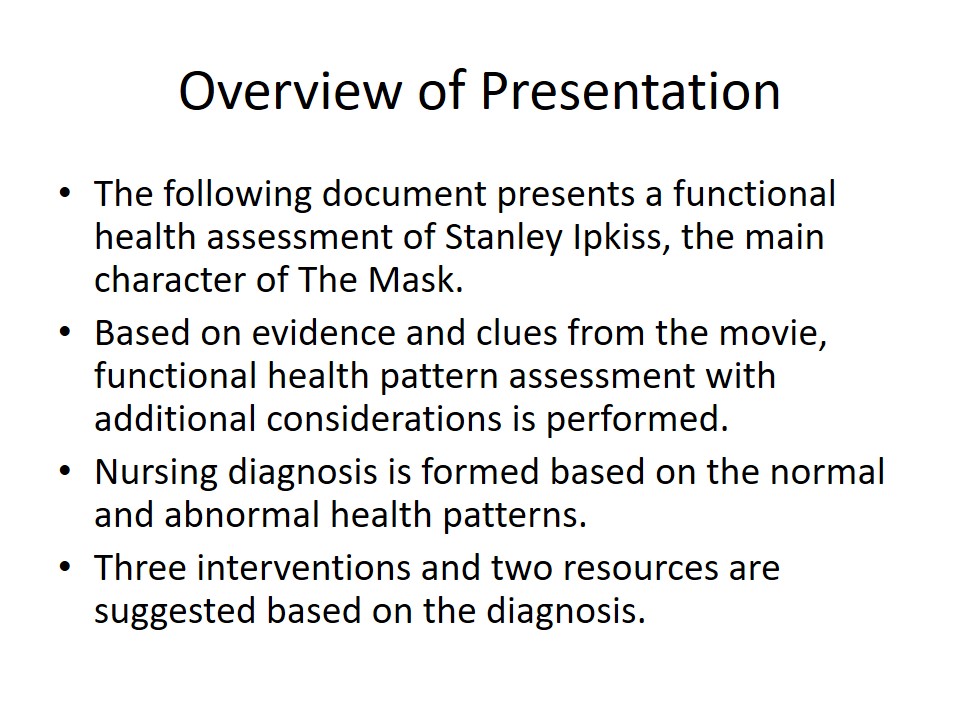
Background of Movie and Character
- The Mask is a romantic comedy with supernatural elements.
- The central character, Stanley Ipkiss, is an employee in a bank of a fictional Edge City.
- The plot focuses on the mysterious artifact that enhances characteristic features of the wearer.
- Stanley is a hopeless romantic who struggles in vain to find his soulmate.
- His shyness and lack of confidence make him an easy target for mistreatment of the peers.
- By wearing the mask, he turns into a bold and mischievous persona.
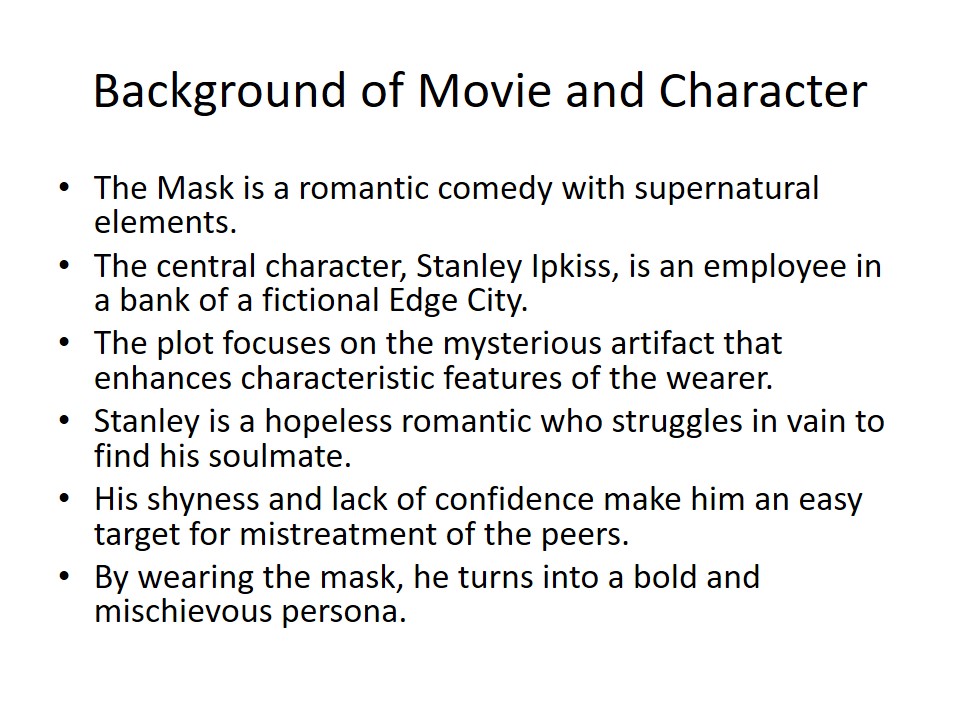
Functional Assessments
- Health Perception/Health Management:
- Stanley works in a relatively safe environment (bank) with minimal risk of workplace accidents.
- Maintains healthy behavior (no indications of smoking or alcohol consumption throughout the movie).
- Examination: no adverse health conditions detectable from character’s appearance.
- Nutrition/Metabolic:
- Height: 6 ft. 2 in. Weight: 156 pounds (actor’s metrics used).
- Healthy dietary habits (regular food intake spotted).
- Healthy food choices (prefers whole grain meals).
- Teeth in excellent condition.
- Pattern of Elimination:
- No detectable bowel or urinary elimination patterns throughout the film.
- No complaints or apparent discomfort detected.
- Pattern of Activity/Exercise:
- Energy level sufficient for daily routines and professional activity.
- No evidence of physical exercises or visits to the gym.
- Examination: Stanley is highly energetic and maintains high level of personal hygiene.
- Conceptual/Perceptual Pattern:
- No visual or auditory problems (no glasses or hearing aids detected).
- Examination: can read fine print, no apparent issues with memory or decision-making, excellent vocabulary level (professional sphere).
- Pattern of Sleep and Rest:
- No reported or apparent sleep problems throughout the movie.
- Well-organized sleep behavior (wears pajamas).
- No nightmares or disturbing dreams aside from mask experience.
- Pattern of Self Perception and Self Concept:
- Most of the time, Stanley feels good about himself.
- Occasional failures in search for a girlfriend set off gloomy thoughts.
- No signs of anxiety or anger, positive attitude.
- Brief feelings of losing hope.
- Role/Relationship Patterns:
- Ipkiss lives alone with his dog.
- No apparent connections to family.
- No established relationship despite best efforts.
- One genuinely supportive character (co-worker).
- No indication of friends or participation in social activities.
- Sexuality/Reproductive Patterns:
- The movie does not provide details on character’s sexual activities.
- Likely no regular sexual activity recently.
- Pattern of Coping and Stress Tolerance:
- Stanley’s life is relatively well-organized.
- Low likelihood of recent crisis or major change.
- No indication of use of medications during gloomy mood.
- Negative emotions addressed by optimistic attitude (no specific techniques detected).
- Pattern of Values and Beliefs:
- No apparent plans for future.
- Likely dissatisfied with current achievements.
- No indication of religion as important part of life.
- No religious interference with planned interventions.
To improve metabolic assessment, the height and weight of Jim Carey, who portrayed Ipkiss, were used.
In two scenes it can be seen that Stanley eats whole-grain porridge, which suggests it as his regular choice and is considered healthy.
The character is highly energetic both at work and at home, which is uncommon for a sedentary job.
Stanley owns a Jack Russel terrier, a breed that requires considerable physical activity.
Stanley’s pajamas, featured prominently throughout the movie, allows us to imply that his sleep patterns are well-organized. He also appears well-rested and energized in the morning scenes.
The character maintains an optimistic and upbeat stance when faced with constant difficulties. However, he is visibly dismayed by the unsuccessful relationship attempts with a co-worker and is strongly moved by attention signs from female customers.
His fellow employees frequently take advantage of his humble and shy character. Only one co-worker (Charlie Schumaker) is openly supportive and compassionate of him.
Stanley does not explicitly voice dissatisfaction with achievements and his position in life. His attitudes are mostly positive and he quickly recovers from gloomy mood (although no systemic approach is detectable). However, the behavior of the Mask character (who represents Stanley’s core priorities in an exaggerated manner) points to the strong subliminal desire of finding a lifetime partner.
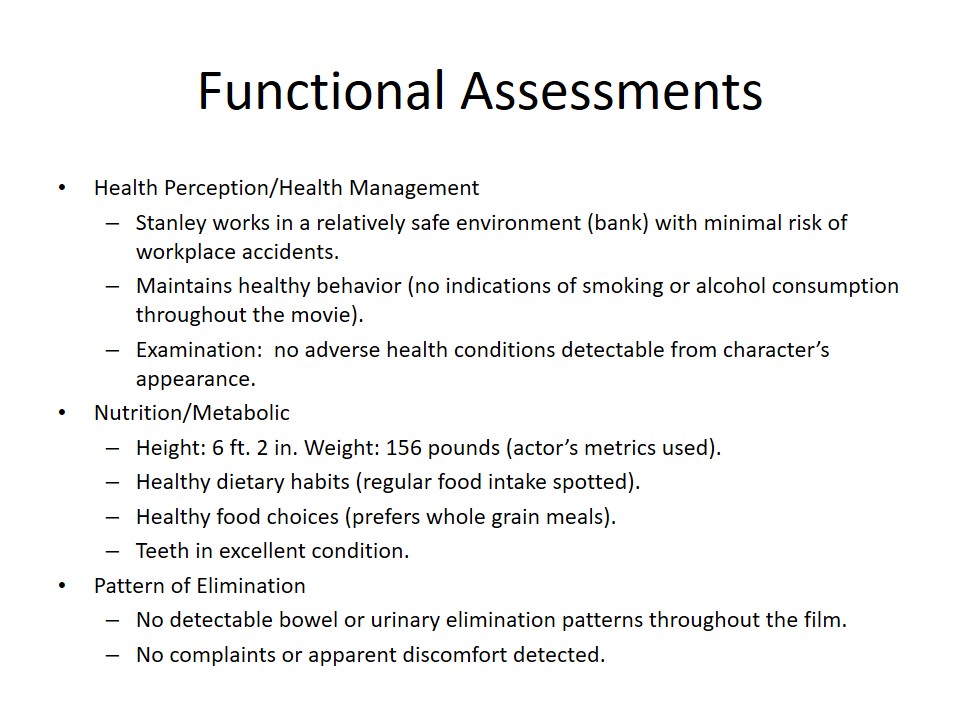
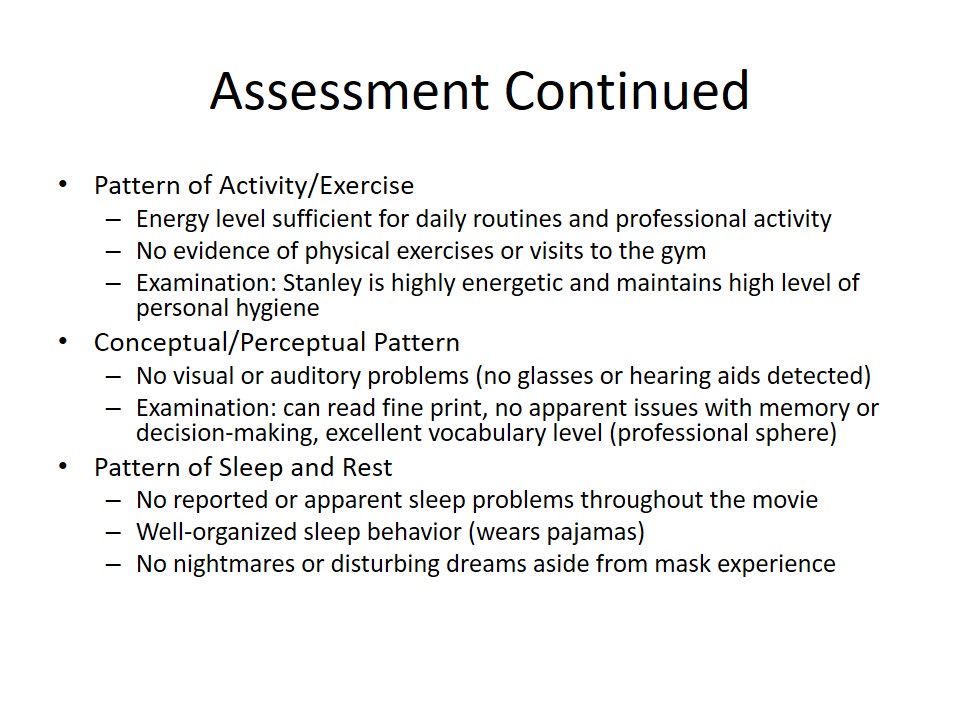
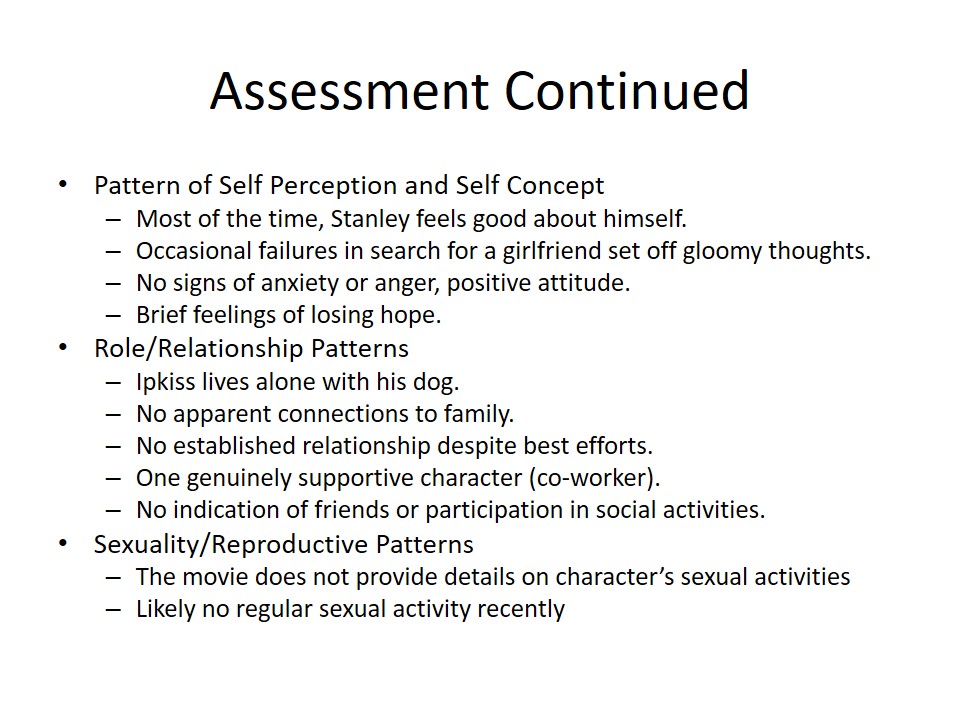
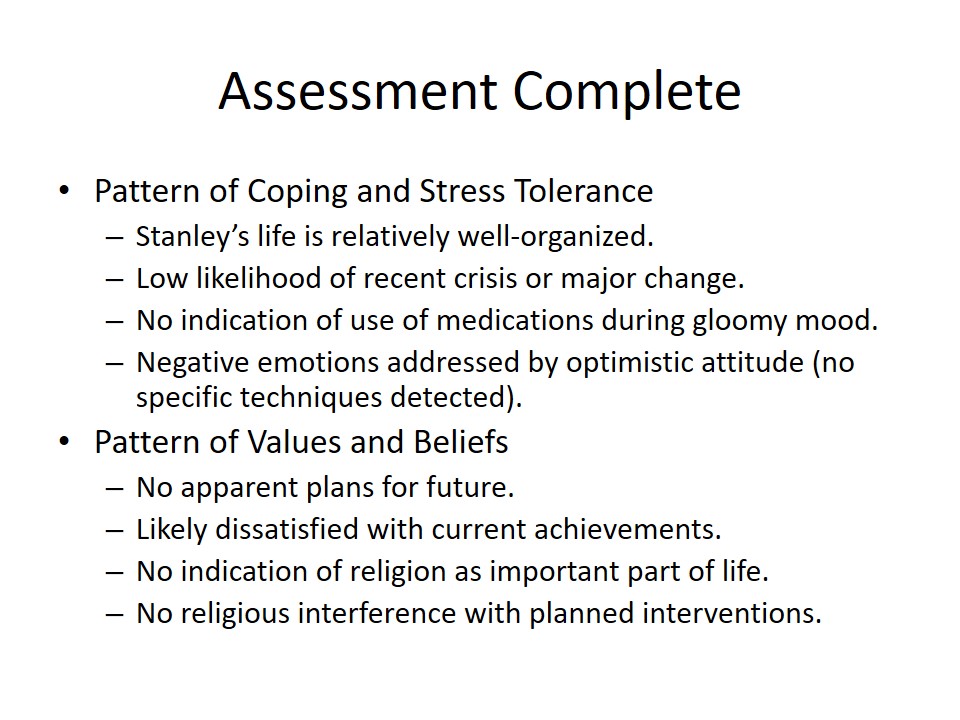
Analysis of Health Assessment
- Normal assessment findings:
- The patient is in very good physical condition; all behaviors (sleep, nutrition) consistent with healthy lifestyle.
- Stanley is highly energetic and generally optimistic; does not resort to medications or substance abuse.
- Abnormal or risk-based findings:
- No connection to family, no social ties, no participation in social groups, constant failures in finding sexual partner (implied by the movie).
- Occasional breakdowns caused by dissatisfaction with life (can be observed upon his returns home).
The patient shows no issues of adverse physical condition and is in relatively good shape considering no apparent proactive pursuit of physical health. With the exception of occasional gloominess following the unsuccessful dating attempts. On the other hand, several risk factors of social and psychological character open up the possibility of gradual buildup of stress and anxiety and, possibly, spiritual crisis (caused by the dissatisfaction with achievements in life).
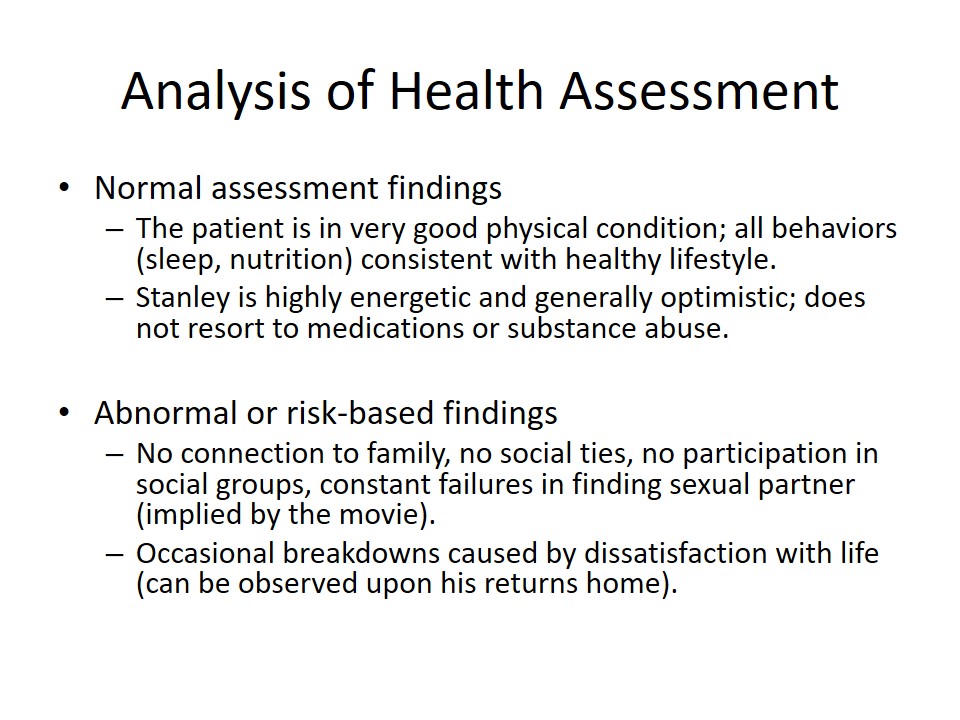
Additional Observations
- Cultural
- The patient does not respond to common cultural behaviors and is highly susceptible to selfish abuse of peers.
- Geographical
- The patient’s profile is generally consistent with the typical resident of the Edge City, likely modeled after New York City.
- Religious
- Stanley does not explicitly display involvement in religious practices.
- Ethnic
- The patient is able to recognize ethnic clues and accept diversification in beliefs (seen through interaction with the mask).
- Spiritual
- The patient readily accepts the existence of supernatural forces and rejects the idea of their delusional nature (visit to Dr. Neuman).
Stanley is easily convinced in the supernatural qualities of the mask and shows excellent cognitive capacity by quickly understanding its working principles. This characterizes him as open to unfamiliar cultural and spiritual concepts and diversity of opinions.
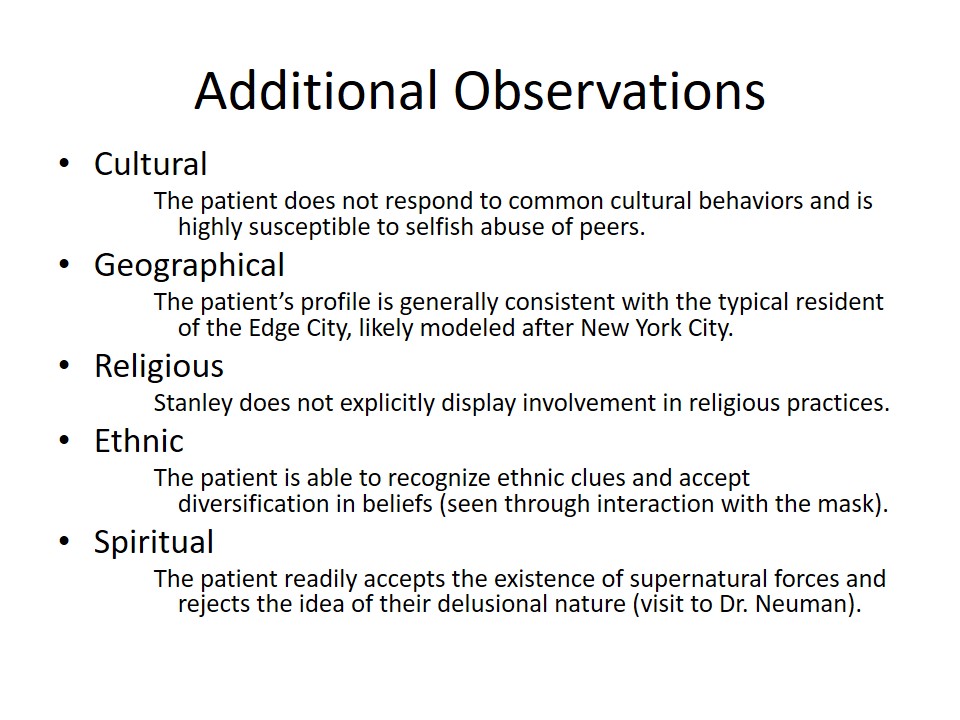
Nursing Considerations
- Nursing Diagnosis:
- Poor capacity for peer interaction.
- Risk of depression triggered by inability to find a girlfriend.
- Risk of mood disorders associated with isolation and loneliness (Holt-Lunstad, Smith, Baker, Harris, & Stephenson, 2015).
- Non-frequent emotional breakdowns (non-severe).
- Interventions:
- One: Invoke feeling of trust and security, plan regular meetings for monitoring emotional state, counseling, and support (Varcarolis, 2016).
- Two: Promote self-management through motivational techniques and consistent benchmarking of achievements (Pulvirenti, McMillan, & Lawn, 2014).
- Three: Empower the patient to take proactive social stance through referrals to social groups (Stanhope & Lancaster, 2015).
- Resources:
- One: Community groups and events focusing on sustainable personal development.
- Two: Literature on self-esteem development and interactive tools for planning and evaluation of success.
Considering the lack of pressing issues and excellent emotional robustness of the patient, promotion of independence and self-sustainability is both the most efficient and desired intervention. The biggest risk for Stanley is associated with loneliness and social isolation, so involvement of social interaction is preferred at the initial stage (Varcarolis, 2016). Over time, greater self-reliance is expected considering the identified traits (Pulvirenti, McMillan, & Lawn, 2014).
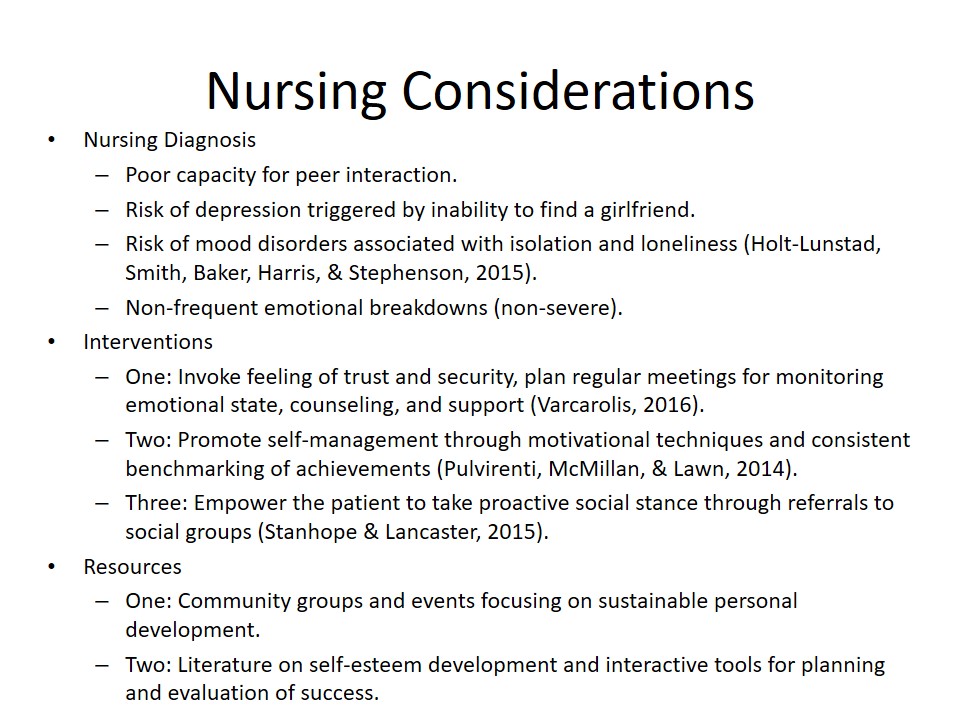
Conclusion
- Stanley Ipkiss displays no signs of adverse physical conditions.
- Maintains healthy habits and positive attitude to life despite frequent throwbacks.
- Risks include social isolation, absence of ties with relatives, and inability to establish family.
- The patient shows enormous capacity for self-management but no consistency in results.
- The systematic approach to self-management supported by counseling and community support is expected to eliminate most risks.
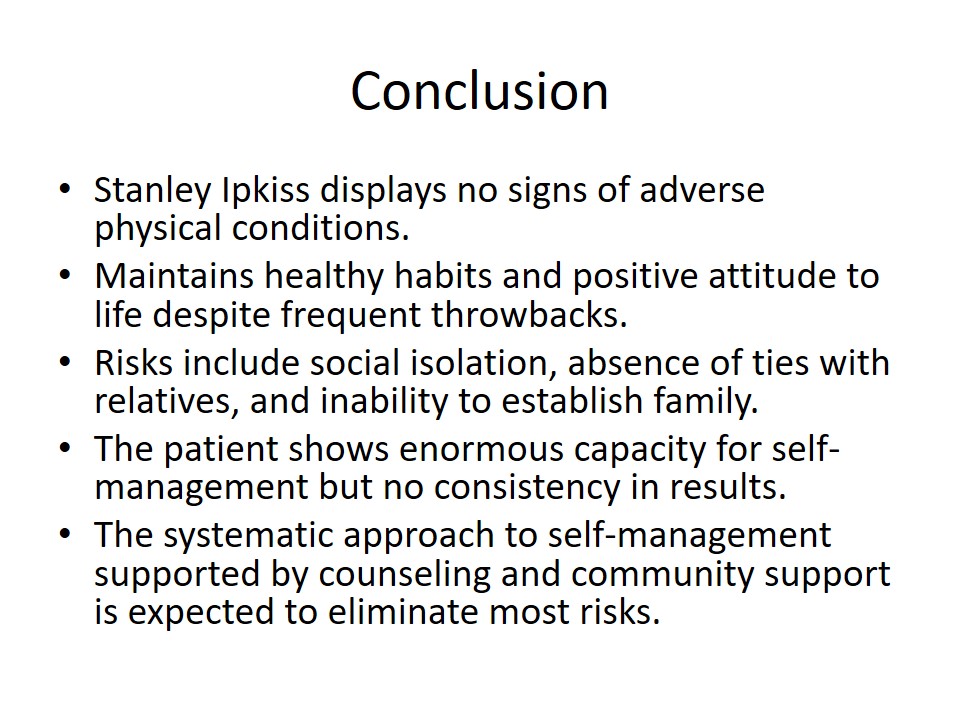
References
Holt-Lunstad, J., Smith, T. B., Baker, M., Harris, T., & Stephenson, D. (2015). Loneliness and social isolation as risk factors for mortality: A meta-analytic review. Perspectives on Psychological Science, 10(2), 227-237.
Pulvirenti, M., McMillan, J., & Lawn, S. (2014). Empowerment, patient centred care and self‐management. Health Expectations, 17(3), 303-310.
Stanhope, M., & Lancaster, J. (2015). Public health nursing: Population-centered health care in the community. Charlottesville, VA: Elsevier Health Sciences.
Varcarolis, E. M. (2016). Essentials of psychiatric mental health nursing: A communication approach to evidence-based care. St. Louis, MO: Elsevier Health Sciences.